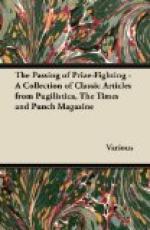She is delightful when she touches on life. “Two,” she says, “may sit at a feast, but the feast is not thereby doubled.” And, again, “Passion may lift us to Himalaya heights, but the hams are smoked in a chimney.” And this of the soul, “He who fashions a waterproof prevents not the clouds from dripping moisture.” Of stockings she observes that, “The knitting-needles are long, but the turn of the heel is a teaser.” Here there is a delightful irony of which matrons and maids may take note.
Such, then, was our JOANNA—JOANNA MERESIA SPRATT, to give her that full name by which posterity is to know her—an ardent, bubbling, bacon-loving girl-nature, with hands reaching from earth to the stars, that blinked egregiously at the sight of her innocent beauty, and hid themselves in winding clouds for very love of her.
CHAPTER III.
Sir JOHN SPRATT had fashions that were peculiarly his own. Vain it were to inquire how, from the long-perished SPRATTS that went before him, he drew that form of human mind which was his. Laws that are hidden from our prying eyes ordain that a man shall be the visible exemplar of vanished ages, offering here and there a hook of remembrance, on which a philosopher may hang a theory for the world’s admiring gaze. Far back in the misty past, of which the fabulists bear record, there have swum SPRATTS within this human ocean, and of these the ultimate and proudest was he with whose life-story we are concerned. It was his habit to carry with him on all journeys a bulky note-book, the store in which he laid by for occasions of use the thoughts that thronged upon him, now feverishly, as with the exultant leap of a rough-coated canine companion, released from the thraldom of chain and kennel, and eager to seek the Serpentine haunts of water-nymphs, and of sticks that fell with a splash, and are brought back time and again whilst the shaken spray bedews the onlookers; now with the staid and solemn progression that is beloved of the equine drawers of four-wheeled chariots, protesting with many growls against a load of occupants.
He had met JOANNA. They had conversed. “An empty table, is it not?” said she. “Nowhere!” said he, and they proceeded. His “Nowhere!” had a penetrating significance—the more significant for the sense that it left vague.
And so the marriage was arranged, the word that was to make one of those who had hitherto been two had been spoken, and the celebrating gifts came pouring in to the pair.
Sir JOHN walked home with triumph swelling high in his heart. Overhead the storm-clouds gathered ominously. First with a patter, then with a drenching flood, the prisoned rain burst its bars, and dashed clamouring down to the free earth. He paused, umbrellaless, under a glimmering lamp-post. The hurrying steeds of a carriage, passing at great speed, dashed the gathered slush of the street over his dark-blue Melton over-coat. The imprecations of the coachman and his jeers mingled strangely with the elemental roar. Sir JOHN heeded them not. He stood moveless for a space, then slowly drawing forth his note-book, and sharpening his pencil, he wrote the following phrase:—“Laid Brother to Banjo, one, two, three, 5 to 4.”




